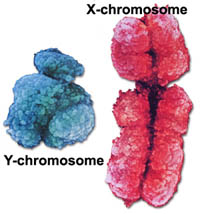 A study of the human Y chromosome found that seven men with a rare Yorkshire surname carry a rare genetic signature found only in people of African origin. Researchers Turi King and Mark Jobling from Leicester University found that the men appear to have shared a common ancestor in the 18th Century, but the African DNA lineage they carry could have reached Britain centuries earlier.
A study of the human Y chromosome found that seven men with a rare Yorkshire surname carry a rare genetic signature found only in people of African origin. Researchers Turi King and Mark Jobling from Leicester University found that the men appear to have shared a common ancestor in the 18th Century, but the African DNA lineage they carry could have reached Britain centuries earlier.
This discovery was the result of genetic research that analyzed the relationship between the Y chromosome and surnames. The Y chromosome is normally found only in males and it is passed from father to son, relatively unchanged, just like a surname.
However, over time, the Y chromosome does accumulate small changes in its DNA sequence so scientists can then study the relationships between different male lineages. The scientists classified these differences into different groups, called haplogroups, which can indicate a person's geographical ancestry.
King and Jobling then collaborated with a genealogist determine how the men were related and to find where their Y haplogroup originated by placing the men into a family tree.
"He could only get them into two trees, one which dates back to 1788 and the other to 1789. He couldn't go back any further. So it's likely they join up in the early 18th Century," said King.
The majority of the one million people who define themselves as "black" or "black British" trace their origins to immigration from the Caribbean or Africa from the middle of the 20th Century onwards.
Prior to the 20th Century, there have been various routes by which people of African ancestry might have reached Britain. For example, the Romans recruited from Africa and elsewhere for the garrison that guarded Hadrian's Wall.
The slave trade was the other major route.
"Some of the Africans who arrived in Britain through the slave trade rose quite high up in society, and we know they married with the rest of the population," said King. "It could be either of these two routes." Even if the two family trees link up in the 18th Century, haplogroup A1 could have reached Britain long before that.
"Human migration history is clearly very complex, particularly for an island nation such as ours," said Jobling, who was co-author of the research, "and this study further debunks the idea that there are simple and distinct populations or 'races'."
There are other interesting results. For example, when scientists analysed the DNA of the third US president, Thomas Jefferson, they found that his Y chromosome belonged to a haplogroup known as K2. Even though Jefferson's father claimed Welsh ancestry, his Y haplogroup is rare in Europe and has not yet been reported in Britain.
In fact, genetic studies show that Thomas Jefferson's K2 haplogroup ultimately came from north-east Africa or the Middle East, the areas where it is most commonly found today.
Details of the study appear in the European Journal of Human Genetics.
Cited story.
Image source.

Have you read The Journey of Man, A genetic Odyssey by Spencer Wells?
Clapping
Chardyspal
I would go with the slave trade as well: many of the ports involved were up north (e.g. Liverpool), serving the cotton industry.
Wouldn't it would be ironic if the surname was Wilberforce?
Bob
Thank you for submitting your article to the Carnival of Genealogy! It doesn't fit with our current edition's topic (recognizing those who've helped with our research) but I will definitely include it in a future edition. Fascinating stuff!
Hello,
Just wanted to let you know that your article appeared in the latest edition of the Carnival of Genealogy.
http://creativegene.blogspot.com/2007/
04/carnival-of-genealogy-22nd-edition.html
Thanks for sharing!